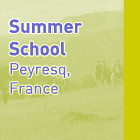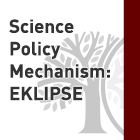Tuesday 2 May
|
| 12.00-13.00 |
Registration and lunch |
| 13.00-15.30 |
Side events:
- ALTER-Net Summer school Alumni meeting/Early career meeting
- organised by João Manuel Garcia Rodrigues and Klara Johanna Winkler
- Room Monica
- Exchange of interest on upcoming calls with presentations by Tiago Freitas (DG R&I) and Hilde Eggermont (BiodivERsA)
- organised by Petteri Vihervaara (SYKE), Philip Roche (Irstea) and Mart Külvik (IAES)
- Room Hippo
- Developing the science-society-policy interface on biodiversity and ecosystem services – learning from EKLIPSE and other processes
- organised by Carsten Neßhöver (UFZ)
- Room Nicolaas
- LTSER platforms as vehicles for scientific inquiries into synergies, conflicts and trade-offs in the relationship between nature and society
- organised by Kinga Krauze (ERCE-UNESCO)
- Room Carthago
|
|
| 15.30-16.00 |
Coffee break
|
|
| 16.00-18.00 |
Start of the conference: Plenary session facilitated by Alison Hester (JHI) and opening speech by Maurice Hoffmann (Chair ALTER-Net)
Keynotes:
- Prof. John O’Neill (Manchester University) - Human well-being and environmental goods: what is lost through no net loss?
- Martin Sharman - Science in a post-truth world
- John Linnell (NINA) - Coexisting with wildlife in the Anthropocene: balancing multiple trade-offs in crowded landscapes
|
| 18:30 |
Beer tasting (optional), in the Monastery |
|
[Top]
Wednesday 3 May
|
| 8.30-9.00 |
Registration |
| 9.00-10.30 |
Plenary session chaired by Kurt Jax (UFZ)
Keynotes:
- Femke Wijdekop (Senior Expert Environmental Justice at Stop Ecocide) - Ecocide Law: the duty to care for our common home
- Dries Gorissen (Agency for Nature and Forests) - Participation for social integration
- Eeva Furman (SYKE) - Interlinkages and how to deal with them when aiming to reach the UN Sustainable Development Goals
|
|
| 10.30-11.00 |
Coffee break
|
|
| 11.00-13.00 |
Parallel sessions:
Session 1: A new valuation school: inclusion of plural values of nature in sustainable resource use decisions (organized by Sander Jacobs, Kati Vierikko and Gabriela Costea)
- Henk van Hardeveld: Towards participatory Multi Criteria Decision Analysis of ecosystem services: the case of Dutch peatlands
- Jen Holzer: Insights from a qualitative evaluation of three European socio-ecological research platforms
- Liliana Solé-Figueras: A review on coastal ecosystem services, are we considering socio-ecological complexity and human well-being?
- Helen Michels: What has nature to offer you? In search of stakeholder preferences in the context of developing a regional vision
- Katja Schmidt: Testing socio-cultural valuation methods of ecosystem services to explain land use preferences
Session 2: Partners for nature: towards new models for networked governance (organized by Arjen Buijs and Riku Varjopuro)
- Sylvie Van Peene: Trame verte et bleue (green and blue network): an assessment of the cooperation implemented at the national and regional level and at the scale of territories and projects.
- Eerika Albrecht: Strategies for successful peatlands conservation in Finland - Environmental conflicts and stakeholder argumentation
- Thomas Mattijssen: Self-governance in nature conservation: from benefits to co-benefits of active citizenship
- Leen Gorissen: Innovation inspired by Nature: a powerful way to operationalize nature-society synergies
- Arjen Buijs: Networked conservation? In search of governance models to increase synergies between grassroots and policy efforts for nature conservation
- Dries Gorissen: Consolidation of partnerships for nature and society, the Bosland Model
Session 3: Environment and health in urban environments (organized by Timo Assmuth and Hans Keune)
- Hans Keune: European OneHealth/EcoHealth Community of Practice
- Timo Assmuth: Cultural ecosystem services and urban health: Knowledge and gaps
- Vitalija Povilaityte-Petri: Medicinal plants and ethnobotanical knowledge in urban environments
- Timo Assmuth: Engagement with urban blue structure in the Helsinki Metropolitan Area: Obstacles and opportunities
Session 4: Biodiversity research for adaptive management; how to satisfy multiple demands (organized by Geert De Blust and Joan Pino)
- Maarten Stevens/Anik Schneiders: Green Infrastructure as a strategy for halting loss of biodiversity: how to reach 2020 – 2050 targets
- Onno Knol: Bioscore: a species-by-species model to project future changes in biodiversity in Europe
- Paul Pardon: Agroforestry
- Joan Pino: Biodiversity dynamics in forested metropolitan landscapes: the role of landscape context and land use legacy
Session 5: Multiple dimensions of sustainability (ecological, economic, social) (organized by Juliette Young, John Linnell and Jim Casaer)
- John Linnell: Multiple dimensions of sustainability – using wildlife conflicts as an example
- Jim Casaer: The wild boar case in Flanders
- Gracie Verde Selva: Achieving socially equitable conservation through ecological fiscal transfers – what can we learn from the Brazilian Ecological ICMS
- Dave Carss: Sustainable management of Cormorant populations: what might that mean?
- David Ullrich: Anthropogenic services and disservices - a proposal for the analysis of human impact within the ecosystem services framework
- Berit Köhler: A sustainable future of regulated rivers and lakes – what can we learn from the revision of hydropower licenses in Norway?
- Wouter de Groot: The missing pillar: Eudemonic values in the justification of nature conservation
Session 6: Nature-related trade-offs and conflicts between stakeholders (organized by Francis Turkelboom and Eszter Kelemen)
- Francis Turkelboom: When you cannot have it all: Ecosystem services trade-offs in local planning contexts
- Eszter Kelemen: Conflicts over nature’s contribution to people: What can you expect from ecosystem services concepts and tools?
- Klara Johanna Winkler: Thinking humans and nature together in protected areas
- Denisa Badiu: Typologies of environmental conflicts in Romanias protected areas.
- Dave Carss: What’s that got to do with it? The influence of historical legacies on sustainable solutions to European cormorant-fisheries conflicts: considering the past.
- Anne Gerdien Prins: Combining different perspectives to nature to explore opportunities for nature across Europe
- Kerry Waylen: How do European policies shape nature-society interactions? Introducing the MAGIC Approach
|
|
| 13.00-14.00 |
Lunch
|
|
| 14.00-15.30 |
Parallel sessions: continuation of the morning sessions |
|
| 15.30-16.00 |
Coffee break
|
|
| 16.00-18.00 |
Poster session - with awards for the three best posters during the final plenary session, Thursday afternoon |
| 18:30 |
Guided tour (optional), leaving from the Monastery |
|
[Top]
Thursday 4 May
|
| 8.30-9.00 |
Registration |
|
9.00-10.30
|
Plenary session chaired by Allan Watt (CEH)
Keynotes:
- Alison Hester (JHI) - Strategies and tools for tackling trade-offs in Scotland
- Sven Lautenbach (University of Bonn) - Ecosystem services bundles and trade-offs for synergy
|
|
| 10.30-11.00 |
Coffee break
|
|
| 11.00-13.00 |
Parallel sessions:
Session 1: Valuing and accounting of natural capital: assessing its role in the nature-society interface (organized by Robert Kanka, Konar Mutafoglu and Caroline van Leenders)
- Ngoc Tb Duong: Regulation, practice and risk in the distribution of benefits in PES: an exploration in the payment for environmental forest services program, Vietnam
- Caroline van Leenders: Finance for Biodiversity
- Wouter Van Reeth: Valuing land use change in Flanders: A framework for integrated valuation with two applications
- Konar Mutafoglu: What can nature do for jobs, growth and health in Europe? Linking biodiversity and nature protection to socio-economic objectives in European countries
- Marianne Darbi: Voluntary vs. compliance regimes in environmental governance: The example of biodiversity offsets
- Brenda Maria Zoderer: Uncovering potential conflicts between stakeholder groups: Differences in perception of ecosystem service delivery and socio-cultural values
Session 2: Nature-society interactions in cities: a specific challenge in the ‘Urban age’ (organized by Annegret Haase)
Introduction in the session: Annegret Haase (15 min)
First slot
- Vierikko, K. and Haase, D.: More than just green – biocultural diversity of urban parks in two European capitals (20+5 min)
- Haase, A. and Ali, L.: Effects of greening policies in the context of urban shrinkage and reurbanization: synergies, trade-offs and conflicts (20+5 min)
- Assmuth, T. et al.: Engagement with urban blue structure in the Helsinki Metropolitan Area: Obstacles and opportunities (20+5 min)
- Overall discussion: 25 min (chaired by Annegret Haase)
- Wrap-up of the slot: Annegret Haase: 5 min
Second slot
- Short introduction with wrap-up from first slot: Annegret Haase (5 min)
- Dushkova, D. et al.: Chances and challenges for being a green city at the North of Russia under extreme climate conditions and with the legacy of Soviet era (20+5 min)
- Nikodinoska, N. et al.: Economic valuation of ecosystem services provided by green urban areas: a review (20+5 min)
- General discussion: 30 min (chaired by Diana Dushkova)
- Summary and conclusion from the session: Annegret Haase (5 min)
Session 3: ES bundles and multi-functional landscapes – operationalizing synergies and trade-offs (organized by Simone Beichler and Sofie VandeWoestijne)
Introduction in the session
- Simone A. Beichler: Synergies between what, where, why… - a multitude of coalescing, complementing or conflicting approaches?
- Sofie Vandewoestijne: Operationalizing synergies and trade-offs into management and decision-making for effective Nature-based solutions
First slot
- Marion Mehring : Social-ecological Dynamics of Ecosystem Services Supply and Demand – A Functional Relation
- Emilie Pecheur: Ensuring consistency of tools dedicated to biodiversity and ecosystem services: case studies
- André Mascarenhas : Effects of demographic and urban development on ecosystem services: the case of Lisbon Metropolitan Area, Portugal
- Maarten Stevens: Bundles as tailored building blocks for multifunctional landscapes
Second slot
- Marie Fournier: Land use regulation in river restoration projects: towards more synergies between nature and society?
- Dagmar Haase: The nexus between urban shrinkage, regrowth and UES provision: Impacts on governance and planning responses
- Inne Vught: To build or not to build: an ecosystem approach to support decision-making on the potential development of residential development areas
Session 4: Collaborative processes in the field of biodiversity research (organized by Corina Basnou and Györgyi Bela)
- Katarzyna Cieslik: Environmental Virtual Observatories for Connective Action – A Cross-Country Citizen Science Project in Africa
- André Mascarenhas: Assessing and engaging stakeholders in a citizen observatory for Land-Use/Land Cover monitoring
- Leena Kopperoinen: Mapping people’s perceived values of CES is needed to get synergies in spatial planning
- Gÿorgyi Bela: Open and citizen science in sustainability research. Reflections on the responsible research and innovation (RRI) discourse
- Martin Watson: Engaging stakeholders to co-develop synergies and trade-offs
- Maxime Lenormand: Cultural Ecosystem Services: An Empirical approach across European landscapes and beyond
- Wessel Ganzevoort: Motivations for monitoring: What drives volunteer biodiversity recorders?
Session 5: Policy, decision-making and social learning for conservation (organized by Arjen Buijs and Riku Varjopuro)
- Romina Rodela: How is you interventions doing?: Methodological challenges with delivery and evaluation of learning-based interventions
- Sander Van der Jagt: Urban forest governance in Scotland: Lessons from local authorities rising up against the odds .
- Frank Hanssen: Consensus based siting of renewable energy (ConSite)
- Emma McKinley: Resilcoast - Ecosystem Service Values and their role in Policy
- Rik De Vreese: Green Learning Environments for Children with Learning Disabilities
- Peter van Gossum: Putting the ecosystem services approach in policy practice: lessons from the Flemish regional ecosystem assessment
- Anna Salomaa: Increasing the effectiveness of nature conservation through science-policy interfaces
|
|
| 13.00-14.00 |
Lunch
|
|
| 14.00-15.30 |
Parallel sessions: continuation of the morning sessions |
|
| 15.30-16.00 |
Coffee break
|
|
| 16.00-18.00 |
Plenary session:
- Keynote speech: Henk van Zeijts (PBL) – European Nature in the plural
- Summary of the outcomes of the parallel sessions
- Panel debate facilitated by Alison Hester
Panel:
- Raoul Mille (Irstea, international affairs)
- Maurice Hoffmann (INBO)
- Birgit de Boissezon (EC)
|
| 19:00 |
Walking dinner (optional), in the Monastery |










